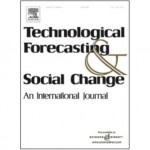Journal | Technological Forecasting and Social Change | Public policy for open innovation: Frameworks, priorities and mechanisms (Abstracts): October 1, 2018
 Special Issue Editors
Special Issue Editors
António Bob Santos – antonio.santos@ani.pt
Marcel Bogers – marcel@ifro.ku.dk
Maria Theresa Norn – mtn@ps.au.dk
Sandro Mendonça – sfm@iscte-iul.pt
Background
Open innovation (OI) is a vibrant research area in academia and is capturing growing attention in the industry. The concept, advanced by Chesbrough in 2003 was more recently redefined (Chesbrough and Bogers, 2014: 17) to put into application in a multitude of organisations. However, research has so far mostly been focused at the business level and communities of innovators.
To have a more comprehensive understanding of the phenomenon it is time to further advance research at other levels. Namely in the context of innovation systems and public policy (Bogers et al., 2017; Santos & Mendonça, 2017). Over the past decade, policymakers around the world have increasingly launched initiatives with the aim of promoting OI. But, the motivations, set-ups, and outcomes of these efforts are still little understood. The rationale for promoting Open Innovation, at the meso and macro-levels, has remained an under-researched topic in the literature (Santos & Mendonça, 2017). In the report, they put forth a series of recommendations for public policies aimed at improving the climate for Open Innovation. Thus, contributing to harnessing the innovation and growth potential of new developments in private sector innovation.
The Special Issue is set to attract and integrate views and evidence on public policy enhancing Open Innovation practices, goals and collective benefits. Specifically, the Special Issue is mostly focusing on industrial policy aims, i.e. Open Innovation-informed policy for the private productive sector. This Call for Papers springs from the assumption that Open Innovation can be enacted, fostered and strengthened by the action of public policies. Broadly speaking, this Special Issue’s main objectives are: 1) clarifying the rationale and role of public policy in the creation of framework conditions, for the adoption of Open Innovation by organisations and networks (private as well as public). 2) Identify specific mechanisms and applied instruments that can contribute to OI-friendly purposes. As with many policy cycles of hype (see agendas such as “smart growth” and “societal challenges”), it is important to detect mere label repackaging, shake-out rhetorical noise that dilutes the original purpose of Open Innovation, and to stimulate the debate and cumulative progress about this topic. Put simply, the Special Issue is a call for a creative consolidation of the research carried on OI when it intersects with the policy and institutional dimensions. Finally, the agenda-setting intents to stimulate the debate and progress the intellectual and strategic pathway.
Subject coverage
This Special Issue calls for contributions that expand existing knowledge and provide guidance on how public policy can contribute to the development and diffusion of OI. This can happen through both inventors and entrepreneurs, companies and organisations, incubators and science parks, universities and research laboratories, NGOs and think tanks, development banks and international institutions. It invites original works that explore novel innovation policy design (sectoral policy, regulatory measures, property rights, fiscal and financial incentives, incubator design, etc.) and strategic criteria (network failure, crowding-in, lead-market creation, breakthrough innovations, key sectors, etc.) that can boost OI activities, namely in the direction of societal challenges and looming global wicked problems (social inequality, clean governance, climate change, food security, the right to privacy, etc.). However, and given the potential diversity of approaches, it is worth emphasising, the Special Issue is mostly focusing on industrial policy aims, i.e. open Innovation-informed policy for the private productive sector.
The Special Issue editors will welcome papers addressing key issues such as:
- Theoretical and conceptual developments about the relation of OI and public policies;
- Empirical evidence about the impact of public instruments and policy on the adoption of OI by organisations in specific industries (low-tech and traditional sectors, consumer and professional services, resource-dependent activities, etc.) in industrialised as well as catching-up economies;
- Future research challenges to democratise innovation in society, improve competitiveness in companies and the socio-economic development countries using the OI approach.
Possible topics could, for example, relate to (but not limited to) the following areas of interest:
- Rationales for supporting open innovation strategies at the micro level;
- Institutional aspects of public policy for open innovation
- Openness-friendly governance of science and technology;
- Open innovation for catching-up and development;
- Mature industry renewal and service economy up-grade;
- Post-linear innovation and smart industrial policy;
- Building open national, regional and sectoral systems;
- Cluster-oriented, smart-city and community-enhancing policy;
- Venture capital and crowdsourced-based finance;
- Facilitation of start-up emergence and spin-off survival;
- Pro, anti and post intellectual property regulatory approaches;
- Open Data, Big Data and Open environments for innovation;
- Open science as an emergent sectoral innovation system;
- Overlaps with topical concepts (industry 4.0, bioeconomy, etc.);
- Transformative OI policy;
- Political economy criticism of OI;
- etc.
Submissions
You are invited to submit your paper. Full manuscripts should be submitted no later than 1 Oct 2018 following the standard guidelines of Technological Forecasting and Social Change (TFSC), which can be found on the journal’s website (see https://www.elsevier.com/journals/technological-forecasting-and-social-change/0040-1625/guide-for-authors). The papers will be selected competitively according to their intrinsic quality and fit to the special issue. All resulting papers will go through a double-blind refereeing process.
Submissions should be sent electronically in word format to the editors to this address: policy4inno@gmail.com. The email should carry two attached files:
1. The first will contain the full paper (no longer than 8,000 words) with:
- Title;
- Abstract (approximately 80 words);
- Keywords (JEL);
- The identity of the author(s) should NOT be included here.
2. The second will contain only one page including:
- Title;
- Abstract;
- Authors’ identification: names, position, department, name of institution, full postal and e-mail addresses;
- Biographical notes: approximately 100 words per author.
Interested authors who would like to receive feedback on their paper are welcome to submit an extended abstract by July 1st 2018, following these guidelines: 1) an extended abstract running between 400 and 1,000 words. 2) Clearly state (i) the purpose of your study; (ii) the particular topic of your study; (iii) the empirical and theoretical context in which you examine this particular topic; and (iv) the relevance of your study for practitioners, academic scholars, and TFSC readership. You can decide to send an abstract ahead of schedule for feedback, however, this is not mandatory. Also, note that the submission of an abstract is by no means a requirement for full paper submission.
Editors
 António Bob Santos – antonio.santos@ani.pt
António Bob Santos – antonio.santos@ani.pt
 Marcel Bogers – marcel@ifro.ku.dk
Marcel Bogers – marcel@ifro.ku.dk
 Maria Theresa Norn – mtn@ps.au.dk
Maria Theresa Norn – mtn@ps.au.dk
![]() Sandro Mendonça – sfm@iscte-iul.pt
Sandro Mendonça – sfm@iscte-iul.pt
References
- Bogers, M., Zobel, A.-K., Afuah, A., Almirall, E., Brunswicker, S., Dahlander, L., Frederiksen, L., Gawer, A., Gruber, M., Haefliger, S., Hagedoorn, J., Hilgers, D., Laursen, K., Magnusson, M. G., Majchrzak, A., McCarthy, I. P., Moeslein, K. M., Nambisan, S., Piller, F. T., Radziwon, A., Rossi-Lamastra, C., Sims, J., & Ter Wal, A. L. J. 2017. The open innovation research landscape: Established perspectives and emerging themes across different levels of analysis. Industry and Innovation, 24(1): 8-40.
- Chesbrough, H., & Bogers, M. 2014. Explicating open innovation: Clarifying an emerging paradigm for understanding innovation. In H. Chesbrough, W. Vanhaverbeke, & J. West (Eds.), New Frontiers in Open Innovation: 3-28. Oxford: Oxford University Press.
- Dahlander, L., & Gann, D. M. 2010. How open is innovation? Research Policy, 39(6): 699-709.
- Santos, A.B., & Mendonça, S. 2017. Open innovation in clusters: The Portuguese case, In S. Monteiro & E. Carayannis, The Quadruple Innovation Helix Nexus: A Smart Growth Model, Quantitative Empirical Validation and Operationalization for OECD Countries: 245-264. Palgrave MacMillan.
- Veugelers, M., Bury, J., & Viaene, S. 2010. Linking technology intelligence to open innovation. Technological Forecasting and Social Change, 77(2): 335-343.
- West, J., & Bogers, M. 2014. Leveraging external sources of innovation: A review of research on open innovation. Journal of Product Innovation Management, 31(4): 814-831.
- West, J., Salter, A., Vanhaverbeke, W., & Chesbrough, H. 2014. Open innovation: The next decade. Research Policy, 43(5): 805-811.
Call for Papers on the journal website